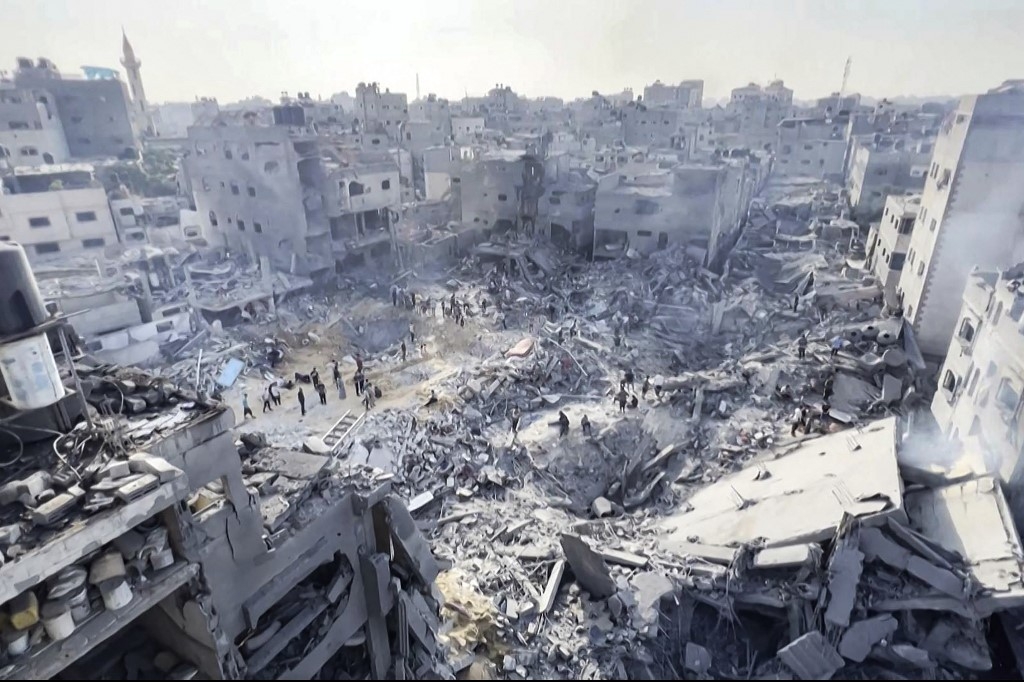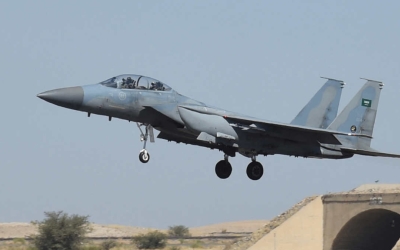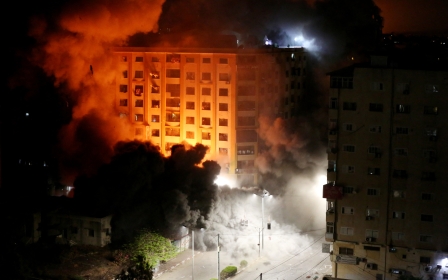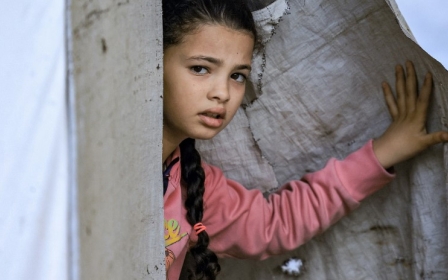Israel-Palestine war: 43 Palestinians killed in two air strikes with US weapons, says Amnesty

Amnesty International has found evidence that the Israeli military used US-made precision-guided munitions in two air strikes on Gaza in October, killing 43 civilians in their homes.
The discovery of the weapon fragments in the rubble of the homes comes as a separate investigation uncovered that the US has rushed orders of precision-guided missiles to Israel since 7 October.
US-based NGO Women for Weapons Trade Transparency (W2T2), citing a State Department source, reported that US officials had invoked a section of the 2021 National Defense Authorization Act to allow the transfer of missiles.
W2T2 have called on the US to immediately halt the transfer of precision-guided missiles to Israel, with Amnesty calling for the strikes to be investigated as war crimes.
“The fact that US-made munitions are being used by Israeli military in unlawful attacks with deadly consequences for civilians should be an urgent wake-up call to the Biden administration," said Agnes Callamard, Amnesty International’s secretary general.
New MEE newsletter: Jerusalem Dispatch
Sign up to get the latest insights and analysis on Israel-Palestine, alongside Turkey Unpacked and other MEE newsletters
Lillian Mauldin, a founding board member of W2T2 and a research fellow at the Center for International Policy, said US lawmakers should pressure the State Department to better understand which munitions have been sent and under what authority.
"Conditions such as adherence to the human rights conditions set forth in the Foreign Assistance Act and adherence with international humanitarian law must be placed on security assistance to Israel," Mauldin said.
Middle East Eye asked the State Department about both investigations and was referred to the department's Wednesday press briefing in which a spokesperson said it was reviewing Amnesty's report.
"As the president and secretary [of state] have said on multiple occasions, it is a tragedy any time a civilian is killed," department spokesperson Matthew Miller said.
"We have made clear in our discussions with Israeli leaders that we are deeply concerned about the protection of civilians in this conflict. We expect Israel to only target legitimate targets and to adhere to the laws of armed conflict."
Miller also said the US would expect the Israel to investigate when it received reports like Amnesty's, just as the US would do, but could not confirm whether the Israelis had given a commitment to investigate.
He would not confirm whether the US was undertaking its own investigation into whether US-made weapons had been used disproportionately.
'Reduced to shreds'
Amnesty says the two air strikes at the centre of its report hit homes full of civilians, with investigators piecing together details from satellite imagery, fragments found in rubble and interviews with surviving family members.
Amnesty said it found no evidence that there were military objectives or targets at either of the locations, raising concerns that the strikes "were direct attacks on civilians or on civilian objects".
Follow Middle East Eye's live coverage for the latest on the Israel-Palestine war
"Even if there had been a legitimate military objective in the vicinity of any of the buildings that were hit, these strikes failed to distinguish between military objectives and civilian objects," Amnesty said. "Indiscriminate strikes that kill or injure civilians constitute war crimes."
The first attack occurred on the evening of 10 October, when an Israeli air strike hit the Al-Najjar residence in Deir al-Balah, a city in central Gaza, killing 21 members of the family and three neighbours.
'We cannot understand why our homes were bombed'
- Bakir Abu Mu'eileq
Suleiman Salman Al-Najjar, 48, a car sales and repair shop owner, lost his wife, Susanne, and four of their children, Farah, 23, Nadim, 20, Yazan, 14, and his 17-month-old daughter, Safa.
Najjar was coming home after receiving hospital treatment for a kidney problem when he heard an explosion and soon learned his home had been bombed.
"I rushed home and saw a scene of utter destruction. I could not believe my eyes. Everybody was under the rubble. The house was completely pulverised. The bodies were reduced to shreds," he told Amnesty.
“Only the body of my son Nadim was recovered whole. My baby girl, Safa, we only found her hand."
Najjar now lives with two surviving sons in a tent by the ruins of his home.
"Our lives have been destroyed in a moment. Our family has been destroyed. Something that was unthinkable is now our reality," he said.
The second attack occurred on 22 October around noon, when an Israeli air strike hit three homes north of Deir al-Balah belonging to the Abu Mu'eileq family, killing 18 family members and their neighbour.
Bakir Abu Mu'eileq, an ear, nose and throat specialist, lost his wife, Islam, 34, and four of their children, Do'a, 16, Ghanem, 14, Mohamed, 12, and Lama, 11.
Abu Mu'eileq told Amnesty that he and his relatives were "focused on our families and work and far from politics".
"We are doctors and scientists, and our focus is living a good life and building a good future for our children," he said. “We cannot understand why our homes were bombed."
According to Amnesty, distinctive markings on fragments found at the two sites indicate that they served as part of the frame that surrounds the body of the bomb of a Joint Direct Attack Munition (JDAM), a kit that can turn "free-fall" bombs into precision-guided missiles.
On recovered scrap, investigators found codes which Amnesty says are associated with the US-based manufacturer Boeing.
Boeing referred MEE to the Department of Defense for a comment, which, in turn, referred MEE to a briefing on Tuesday in which the Pentagon's press secretary said Amnesty's report was being reviewed.
"We are going to continue to consult closely with our Israeli partners on the importance of taking civilian safety into account in conducting their operations," Pentagon Press Secretary Brigadier General Pat Ryder said.
'Weapon of choice'
W2T2 says precision-guided missiles, like those cited in Amnesty's report, have been an "Israeli weapon of choice" in its latest assault on Gaza.
Ninety percent of the weapons the Israeli military used in the first two weeks after 7 October were satellite-guided bombs weighing between 1,000 and 2,000 pounds, they say.
In addition to the strikes which Amnesty has focused on, arms experts have said they believe Israel struck the densely populated Jabalia refugee camp on 31 October and 1 November using precision-guided missiles, killing at least 195 people.
W2T2 reported on Tuesday that US officials have been rushing transfers of the missiles in the past two months, citing the 2021 National Defense Authorization Act.
Section 1275 of the act allows for a limitless transfer of the missiles from the US stockpile to Israel without Congressional notification in the case of an emergency, and assuming it is in American national security interests and US “combat readiness” isn’t compromised.
"We know that the White House has used emergency justifications to bypass Congressional notification and review thus far, so it is highly likely that the emergency justification was also invoked in this process for the same purpose," Mauldin said.
She said it's also unlikely that the public will ever know the exact amount and value of the precision-guided missiles sent to Israel, given the lack of transparency around the arms that the US sells or transfers internationally.
Middle East Eye delivers independent and unrivalled coverage and analysis of the Middle East, North Africa and beyond. To learn more about republishing this content and the associated fees, please fill out this form. More about MEE can be found here.






